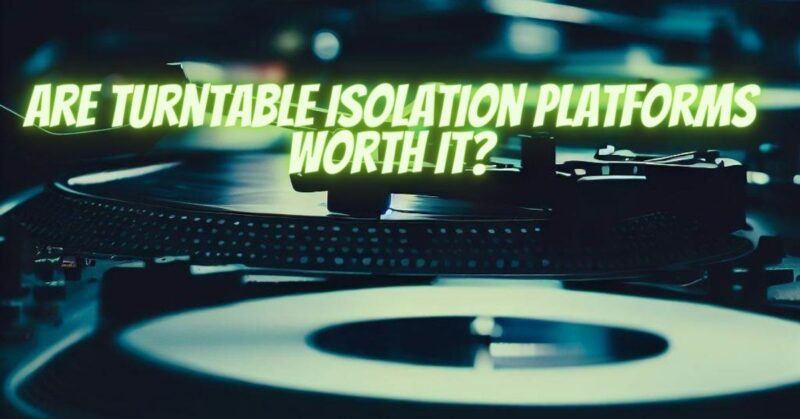Turntable isolation platforms have gained popularity among vinyl enthusiasts and audiophiles as potential solutions to enhance the audio quality of vinyl playback. These platforms are designed to isolate turntables from external vibrations and disturbances. However, their cost and perceived benefits have left many wondering: Are turntable isolation platforms truly worth the investment? In this article, we’ll explore the factors that determine the worthiness of these platforms and help you make an informed decision.
Understanding Turntable Isolation Platforms
Turntable isolation platforms, also known as isolation bases or plinths, are specialized surfaces on which you place your turntable. They are constructed using various materials, such as wood, MDF (medium-density fiberboard), acrylic, or metal, and they incorporate vibration-damping features to minimize external vibrations that can affect audio playback.
Factors to Consider When Evaluating Their Worth
To determine whether a turntable isolation platform is worth the investment, consider the following factors:
- Turntable and Cartridge Quality: The quality of your turntable and cartridge plays a significant role. High-end turntables and cartridges are more sensitive to vibrations and may benefit more from isolation platforms.
- Listening Environment: Assess the environment in which you listen to vinyl records. If your listening space is prone to external vibrations from sources like foot traffic, speakers, or HVAC systems, an isolation platform can be more beneficial.
- Audio Quality Expectations: Consider your expectations for audio quality. If you’re a discerning audiophile seeking the highest fidelity and clarity, even subtle improvements may be worth the investment.
- Budget: Isolation platforms are available at various price points. The cost can range from affordable to high-end. Evaluate your budget and the potential benefits to determine the platform that aligns with your financial resources.
- Turntable Stability: Some turntables are inherently more stable and less susceptible to vibrations. If your turntable is already designed with excellent isolation features, an additional platform may provide limited benefits.
Pros and Cons of Turntable Isolation Platforms
Pros:
- Vibration Reduction: Isolation platforms can effectively reduce vibrations that may compromise audio quality.
- Feedback Prevention: They can help prevent feedback issues, especially in settings with loudspeakers.
- Improved Clarity: Many users report improved audio clarity and reduced background noise.
- Protection: They can protect your turntable from external elements, such as dust and spills.
Cons:
- Cost: High-quality isolation platforms can be expensive, making them a significant investment.
- Variable Impact: The effectiveness can vary based on factors like equipment quality and the listening environment.
- Space Requirements: Platforms can add bulk to your setup and may not be suitable for all setups.
The decision to invest in a turntable isolation platform depends on your specific circumstances and priorities. For those with high-end turntables, sensitive cartridges, and discerning ears, the benefits in terms of improved audio quality and reduced vibrations may justify the cost. Additionally, in environments prone to external vibrations, an isolation platform can be a valuable addition.
However, if you have budget constraints, an entry-level turntable, or a stable listening environment, the impact of an isolation platform may be less pronounced. Ultimately, the choice should align with your audio goals, listening environment, and budget. Consider conducting A/B listening tests to evaluate whether the investment in a turntable isolation platform yields the improvements in audio quality that you desire.


